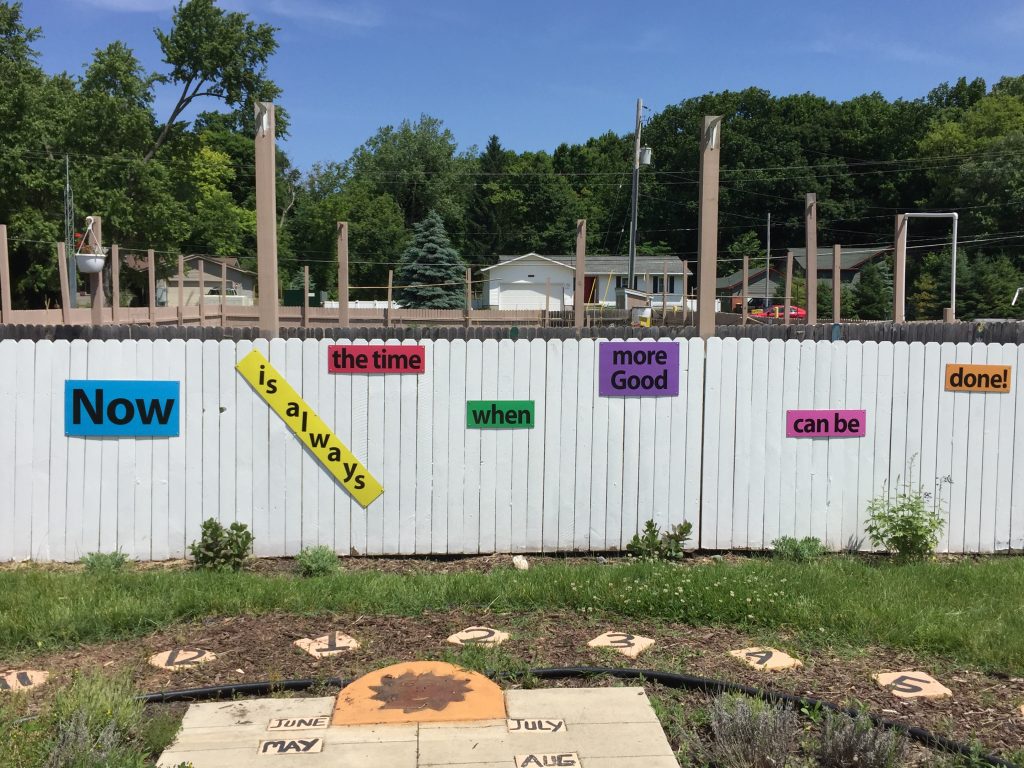Guest blog post by PJS student Bree Casper
“Now is always the time when more good can be done” –John Duley
My name is Bree Casper and I am a senior studying anthropology, with minors in cognitive science and peace and justice studies. This summer I served as an AmeriCorps member at Edgewood Village, a local non-profit housing corporation. Edgewood Village’s mission is to provide affordable housing for low-income residents in East Lansing. Edgewood Village is a unique place because it has a community center, which acts as the heart of the community and provides programming for people of all ages. They offer kid’s programming ranging from after school activities to summer education, to keep kids engaged throughout the year. Adults can also find something to support their interests there, by participating in programming ranging from different types of support groups to monthly potlucks.
Another unique aspect of Edgewood Village is its community garden, which is where I come in. This summer I was the adult garden educator in the Edgewood Village Community Garden. I managed the allotment garden where residents had their own plots. In addition I cultivated community plots where the fruits and vegetables that I grew were donated back to the community. I also led fitness and nutrition programming including classes like chair yoga and nutrition based documentary series.
It was in my time with Edgewood that I learned how truly unsettling food insecurity is in the United States. Many of my residents had trouble securing wholesome, nutritious meals once a day – let alone for three meals a day. I witnessed first hand how the aid given to those in the most desperate of situations may not even be to the receiver’s best interest. Most of the food given through food subsides are nutrient-poor, heavily processed foods. A lot of the community members that received these subsides couldn’t even eat the food due to health problems or dietary needs. More importantly, many already facing significant health issues were left to eat this food, which only exacerbates the health issues they are already battling. As if these issues weren’t enough, many residents lacked proper education about health and nutrition.
This showed me why the garden is such an important landmark in the community. Throughout the summer, I witnessed people coming together in the garden and growing food that they would not otherwise have had access to. I saw people who had no prior gardening experience harvest more than they could eat. I saw friendships formed over soil and plants and how much simple gardening routines could benefit a community. Beyond this, nutrition lessons proved to be incredibly helpful. Residents learned how to prepare healthier meals, and make healthy food substitutes in their diets. I also had a number of residents come together to form a chair yoga class – a program that has helped them relieve stress and continues even after I have left the program.
While I saw the residents’ attitudes and accessibility to food markedly change in my short 4.5 months, they also shaped how I view injustices in the world. There are a lot of factors that have led to the state of food injustice that we are in. Serious policy work needs to happen on the governmental end to aid those in need of more secure food access. This is not an issue that can be solved overnight.
In one of the gardens, aptly named the Peace Thyme Garden, there is a quote from a poem written by one of Edgewood’s founders, John Duley, “Now is always the time when more good can be done.” This quote serves as a constant reminder of the community’s purpose. Moreover, it completely embodies what I learned at Edgewood Village Community Garden this summer. My experiences showed me that there are people that need help in our communities right now. We can sit around and wait for others to devise a solution or we can take action. When you bring a group of motivated people together, they can inspire much more useful change, more immediately, for those in need. I saw my residents come together, work together, sweat together, and learn together. They showed how truly dedicated they were to health and wellness, and when given the proper tools and knowledge excelled beyond belief. Action can start wherever you are, with resources close to you, and can make major changes in the lives of those in our own communities. I saw my residents take justice into their own hands and become more food secure over four months. While there is still a lot of injustice in the realm of food security, I have seen how the actions of a few people can change a community one step at a time.
The peace and justice minor in combination with my experience at Edgewood Village showed me how themes of peace and justice manifest in real life. It allowed me to apply what I had learned in class to real life situations. It also allowed me to add onto what I had learned through first hand experience. Going forward, I will take this experience and the themes of peace and justice into the realm of addiction. At the graduate level I hope to conduct in-depth anthropological research on Americas “war on drugs” and how it affects addicts. More importantly, I hope to bring peace and justice into the conversation and change the way addicts are treated and change the discourse of “the war on drugs” in America.
Working in the garden
Doing service for the annual Russ Mawby Signature Service Project
A picture of MSU Volunteers working in the garden for a service day
Posing for a photo with fellow AmeriCorps member in the Children’s Garden




